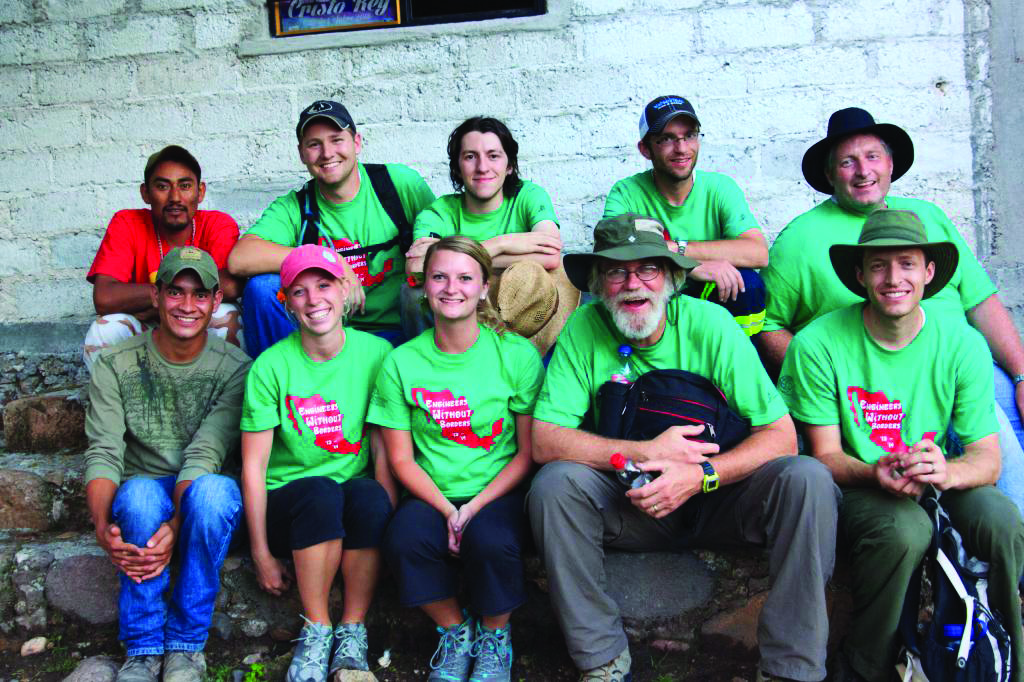USU engineers serve across borders
Volunteers build water filtration systems in Mexico
Christopher Campbell
Senior Writer
Volunteers for Utah State University’s chapter of Engineers Without Borders, or EWB, had a more successful trip to Mexico than they expected. The volunteers worked in a community just outside Irapuato called La Salitrera hoping to make three water filters for the people living there and they ended up building six.
Ryan Dupont, a professor of civil and environmental engineering at USU who was the faculty advisor for the trip, said the success was partly because of the funding efforts. He said because of the low costs in Mexico, they were able to purchase supplies for six filters with money raised by a small school in Millville, Utah. He said another reason had to do with the Non-Governmental Organization, or NGO, they collaborated with called CHOICE Humanitarian.
“We had all the materials for six and we ended up getting a huge amount of help from one of the NGO personnel,” Dupont said. “And we were just able to get it done with the community’s help and with his help with all the supplies we brought.”
Anellise Reynolds, a junior majoring in civil engineering and the team leader for the group who went to Mexico, said the concrete filters use a combination of sand and gravel to filter the water, which comes out cleaner through a tube. On top of the sand, there is a biolayer that forms within a couple weeks filled with microorganisms that eat the harmful bacteria present in the water as it passes through.
Reynolds said it is a slow filtration system that requires people to manually pour three to four buckets of water on top of the filter.
“You want a slower filtration that filters better and more,” Reynolds said. “If you hooked it up to a river system or something like that it wouldn’t be as efficient because it’s better slower.”
Dupont said even though the biolayer was eating the harmful microorganisms, there was another component in the water that threatened the health of the people living in the community. There is a deep underground well with a new supply of water, which they found to have fairly high levels of arsenic.
“Our purpose in making these filters is to help them produce a water that’s low in arsenic so that they’re not being exposed to this new threat,” Dupont said. “The kids we’re worried about because over a lifetime even low exposures can be pretty dangerous and they’ve never had that exposure before they put the wells in.”
Dupont said to filter out the arsenic, they put about one pound of nails at the bottom of a bucket, which had holes in it. The bucket was then placed on top of the filter and water was poured into it.
Reynolds said the eventual rust from the nails reacts with the arsenic, ultimately reducing it. The nails only need to be replaced every six months.
Dupont said the filters are low maintenance. When there is a clog, the people in the community fix it by scraping the surface of the sand with their hand, pulling out the sediment that was released. The sand filter never runs out.
“They’re pretty cost free for maintenance and operation,” Dupont said. “Basically, they are going to last as long as the concrete lasts. That’s 20 or 30 years typically.”
Dupont said this is not the first year USU’s chapter of EWB served this particular community. When they started, they committed to go back once a year for at least five years. He said the reason for this is to make sure what they are building serves the community. An example he gave of what they did not want to do was a soda company that put water wells in areas that had nothing to do with the convenience of people living there. Nobody uses these wells because they are difficult to use.
“That’s what they’re trying to avoid with EWB,” Dupont said. “We’re putting in stuff that the people want, where they want it.”
Pablo Méndez, a sophomore majoring in mechanical engineering who was on the trip with EWB, said the experience was tiring because it was seven days of nonstop work, but it was definitely worth doing. He said knowing it will be helpful to the people made him feel good about it.
“You feel tired in a good way,” Méndez said.
There are two different teams in USU’s chapter of EWB; one goes to Mexico and one goes to Peru.
Sarah McPhie, a junior majoring in biological engineering who is the Peru team leader, said over Spring Break they will go build alpaca shelters. She said this is the first year they will be doing this. Previously, they did a water distribution project and offered to help with water sanitation.
“They approached the community and asked them, ‘Would you like us to help you with your water?’” McPhie said. “And they came back and they were like, ‘Well actually, we’d really like you to help us with our alpaca instead.’”
Reynolds said EWB is not limited to engineers. Non-engineers can join as well.
“You don’t necessarily have to have engineering to understand what’s going on,” Reynolds said.
Reynolds said for the filters, she did not have any previous experience mixing concrete, which is a big part of what they did.
topherwriter@gmail.com
Twitter: @ChrisCampbell02


